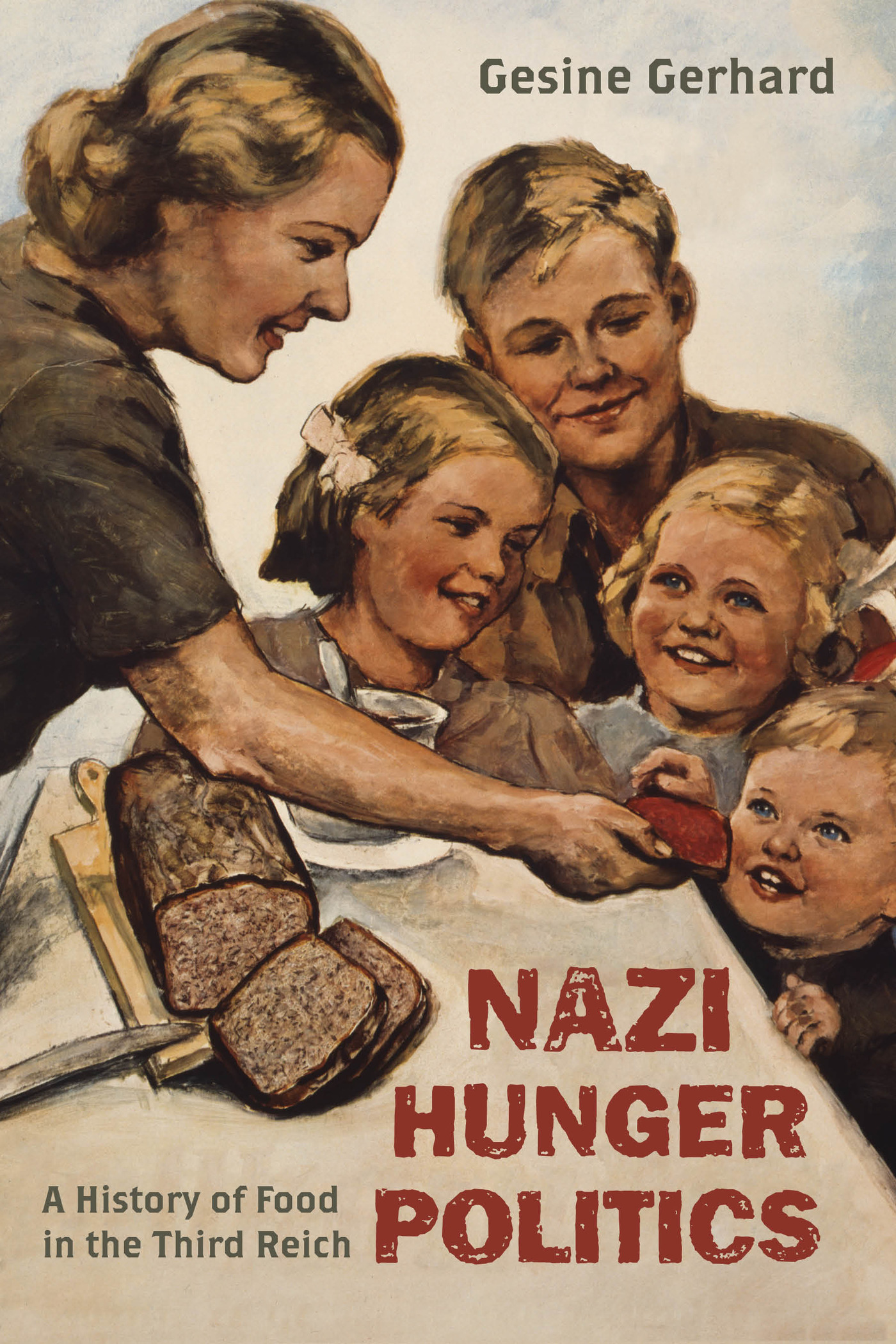Nazi Hunger Politics
Rowman & Littlefield
Studies in Food and Gastronomy
General Editor: Ken Albala, Professor of History, University of the Pacific
(kalbala@pacific.edu)
Rowman & Littlefield Executive Editor: Suzanne Staszak-Silva
(sstaszak-silva@rowman.com)
Food studies is a vibrant and thriving field encompassing not only cooking and eating habits but also issues such as health, sustainability, food safety, and animal rights. Scholars in disciplines as diverse as history, anthropology, sociology, literature, and the arts focus on food. The mission of Rowman & Littlefield Studies in Food and Gastronomy is to publish the best in food scholarship, harnessing the energy, ideas, and creativity of a wide array of food writers today. This broad line of food-related titles will range from food history, interdisciplinary food studies monographs, general interest series, and popular trade titles to textbooks for students and budding chefs, scholarly cookbooks, and reference works.
Titles in the Series
Appetites and Aspirations in Vietnam: Food and Drink in the Long Nineteenth Century, by Erica J. Peters
Three World Cuisines: Italian, Mexican, Chinese, by Ken Albala
Food and Social Media: You Are What You Tweet, by Signe Rousseau
Food and the Novel in Nineteenth-Century America, by Mark McWilliams
Man Bites Dog: Hot Dog Culture in America, by Bruce Kraig and Patty Carrol
New Orleans: A Food Biography, by Elizabeth M. Williams (Big City Food
Biographies series)
A Year in Food and Beer: Recipes and Beer Pairings for Every Season, by Emily Baime and Darin Michaels
Breakfast: A History, by Heather Arndt Anderson (The Meals series)
Celebraciones Mexicanas: History, Traditions, and Recipes, by Andrea Lawson Gray and Adriana Almazn Lahl
Food History Almanac: Over 1,300 Years of World Culinary History, Culture, and Social Influence, by Janet Clarkson
The Food Section: Newspaper Women and the Culinary Community, by Kimberly Wilmot Voss
Small Batch: Pickles, Cheese, Chocolate, Spirits, and the Return of Artisanal Foods, by Suzanne Cope
Nazi Hunger Politics: A History of Food in the Third Reich, by Gesine Gerhard
Nazi Hunger Politics
A History of Food in the Third Reich
Gesine Gerhard
ROWMAN & LITTLEFIELD
Lanham Boulder New York London
Published by Rowman & Littlefield
A wholly owned subsidiary of The Rowman & Littlefield Publishing Group, Inc.
4501 Forbes Boulevard, Suite 200, Lanham, Maryland 20706
www.rowman.com
Unit A, Whitacre Mews, 26-34 Stannary Street, London SE11 4AB
Copyright 2015 by Rowman & Littlefield
All rights reserved. No part of this book may be reproduced in any form or by any electronic or mechanical means, including information storage and retrieval systems, without written permission from the publisher, except by a reviewer who may quote passages in a review.
British Library Cataloguing in Publication Information Available
Library of Congress Cataloging-in-Publication Data
Gerhard, Gesine, 1969
Nazi hunger politics : a history of food in the Third Reich / Gesine Gerhard.
pages cm. (Rowman & Littlefield studies in food and gastronomy)
Includes bibliographical references and index.
ISBN 978-1-4422-2724-8 (cloth : alkaline paper) ISBN 978-1-4422-2725-5 (ebook) 1. Food supplyGovernment policyGermanyHistory20th century. 2. National socialismSocial aspects. 3. World War, 19391945Food supplyGermany. 4. FoodPolitical aspectsGermanyHistory20th century. 5. FoodSocial aspectsGermanyHistory20th century. 6. FoodSymbolic aspectsGermanyHistory20th century. 7. HungerPolitical aspectsGermanyHistory20th century. 8. HungerSocial aspectsGermanyHistory20th century. 9. GermanyPolitics and government19331945. 10. GermanySocial conditions19331945. I. Title.
HD9015.G32G37 2015
363.8'56094309043dc23
2015005789
 TM The paper used in this publication meets the minimum requirements of American National Standard for Information Sciences Permanence of Paper for Printed Library Materials, ANSI/NISO Z39.48-1992.
TM The paper used in this publication meets the minimum requirements of American National Standard for Information Sciences Permanence of Paper for Printed Library Materials, ANSI/NISO Z39.48-1992.
Printed in the United States of America
List of Illustrations
Acknowledgments
This book has been in the works for several years, and along the way, I have received support from many people. I will always be grateful for the encouragement, the critical feedback, and the distractions that helped me continue my labors. The research started in the Federal Archives in Koblenz, Germany, a most welcoming place for any historian. Gregor Pickro in Koblenz represents one of the many archivists I could reliably count on. Herr Pickro suggested I contact the Backe family, and reading this book, you will know where this led me. David Schoenbaum deserves credit as my mentor early on, for it was his critical eye that pushed me much further than I thought I could go. I also owe a large debt to my students at the University of the Pacific, whose curiosity is a constant source of energy. My colleagues in the history department and beyond have been wonderful and inspirational. A special thank-you goes to Ken Albala, who introduced me to food studies and has been supportive since I first put foot on this campus almost sixteen years ago. Caroline Cox gave feedback on everything I needed to talk about, and only her untimely death in July 2014 prevented her from reading drafts of all chapters. The weekly phone calls with Edie Sparks kept me on target during the last writing phase when deadlines could not be pushed out any further. Bill Swagerty and Robin Imhof allowed me to nag them with questions I had along the way. Thank you to Mike Sharp for his careful copyediting of the manuscript and to Gerda Story, who transcribed Ursula Backes diaries for me. I am indebted as well to Wendi Schnaufer, the editor at the press who first recruited me. She had great ideas and a vision for this project. Thank you to peer reviewers of chapter drafts at any stageespecially Ernst Langthaler, Andreas Agos, Ute Gerhard, Wendi Schnaufer, Ken Albala, and Greg Rohlfthe book would not be the same without their comments.
I would also like to thank the Backe siblings, who generously met with me, answered my questions, and allowed me to use their mothers diaries, even though they worried that my work would cast their father in a new light. I am grateful for the friends I have made in California, who have been essential to balance life and work, and for the old friends who stayed in touch over the years. I am lucky to have two sisters, Nele and Ulrike, who will always remain close, no matter how many thousands of miles are between us. The phone conversations with my twin sister kept me going and encouraged me when I needed it most. I would like to thank my mom as well, who has served as a role model for me since I was little, and my dad, too, for his relentless enthusiasm for everything I do. Last but not least I want to thank my husband, Greg, for all the delicious meals he cooks for us with so much love, and our three children, Konrad, Marlene and Charlotte, for all they give and take. It is to them and other little picky eaters that this book is dedicated.
Introduction
Meeting the Backe Family
As the train comes closer and closer to Hanover, I watch the characteristic North German landscape racing past my window. My eyes register the constantly changing scenery as picturesque small towns give way to the green fields and thick forests with the Harz Mountains always visible in the distance. The train crosses rivers and valleys and accelerates in open spaces. Everything is muted. For my homesick North German heart, still not used to taking the car wherever I have to go, there seems to be nothing more relaxing than taking the train in Germany. It feels so luxurious to sit in the fast ICE train transporting me without any apparent effort from one city to the next. I have time to read, work on my laptop, or simply look out the window and let my thoughts wander. My mind often turns to the task awaiting me in Hanover, for it is there that I will personally meet with the children of Herbert Backe, the second Reich Minister of Food and Agriculture during the Nazi period, a central figure in my research for years. Backe was in charge of food politics during the Third Reich and the brain behind the notorious

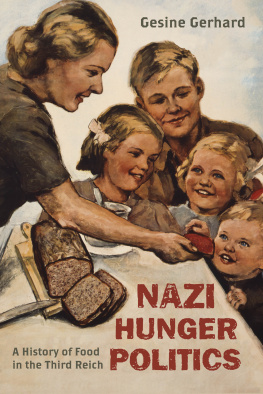






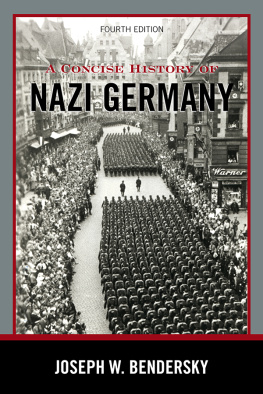
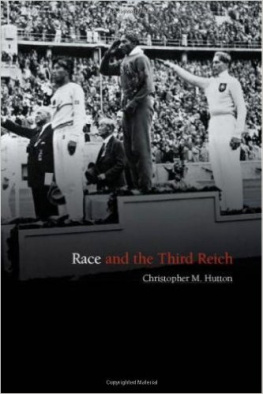
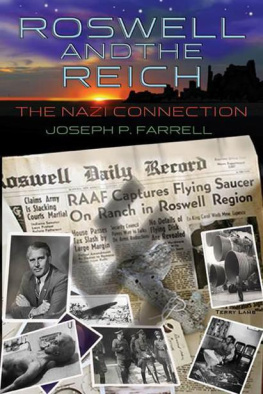
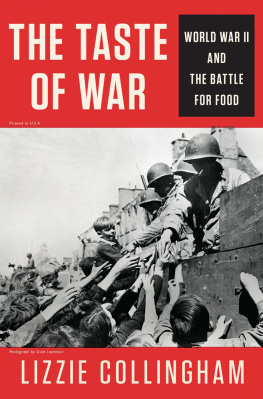
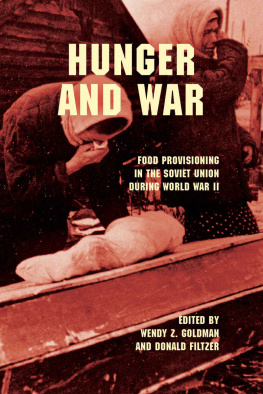
 TM The paper used in this publication meets the minimum requirements of American National Standard for Information Sciences Permanence of Paper for Printed Library Materials, ANSI/NISO Z39.48-1992.
TM The paper used in this publication meets the minimum requirements of American National Standard for Information Sciences Permanence of Paper for Printed Library Materials, ANSI/NISO Z39.48-1992.